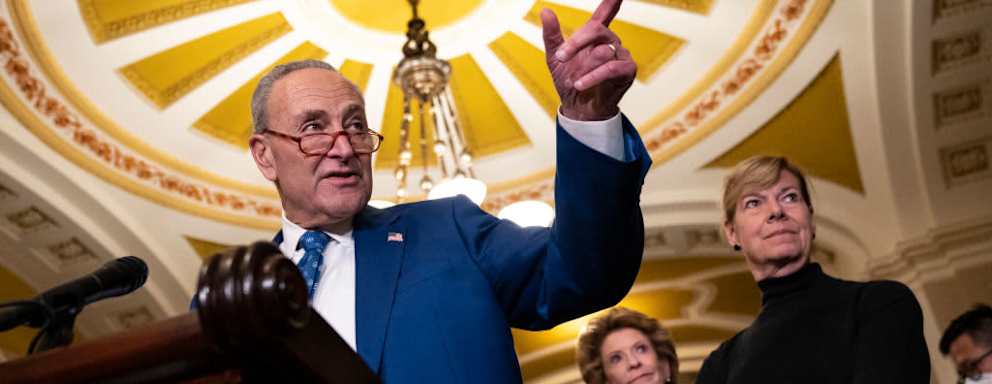Democrats’ Budget Proposal Increases Maximum Pell Grant, Cuts Other Higher Ed Spending
 Credit: Image Credit: Drew Angerer / Staff / Getty Images News
Credit: Image Credit: Drew Angerer / Staff / Getty Images News- The proposal would raise the maximum Pell Grant to $7,645 for the 2024-25 academic year.
- Democrats chose to level-fund other financial aid programs like the federal TRIO program.
- Federal Student Aid would receive more funds to help bolster the office tasked with resuming student loan payments soon.
- The Democrats’ proposal includes an overall cut to higher education programs.
Senate Democrats proposed a modest boost to some higher education programs in the party’s initial budget proposal.
Most notably, Democrats want to increase the maximum Pell Grant award by $250, bringing the maximum award to $7,645 for the 2024-25 academic year. The Pell Grant program is the federal government’s primary means of subsidizing higher education costs for low- and middle-income students, and it benefits over 6 million students annually.
The proposal also includes a $150 million increase in funding to student aid administration. The Democratic-led U.S. Senate Appropriations Committee said in its report that the increase will help support the resumption of federal student loan payments in September 2023.
Congress level-funded Federal Student Aid (FSA) last year, alarming some advocates.
Many other higher education programs, meanwhile, would be level-funded in 2024 under this proposal. That includes Federal TRIO programs and Gaining Early Awareness and Readiness for Undergraduate Programs (GEAR UP).
Overall spending for higher education programs, however, would be cut by approximately $266 million.
Increase to the Max Pell Grant
Senate Democrats hope to continue the trend of increasing the maximum Pell Grant award each year.
President Joe Biden pledged to double the maximum Pell Grant by 2029 last year. Congress responded by passing an omnibus budget bill in late 2022 that increased the maximum Pell Grant by $500 for the 2023-24 academic year. That was a 7.2% increase from the year prior.
The latest proposal would be more modest.
A $250 increase to the maximum Pell Grant would constitute a 3.4% increase from the year prior. It would bring the combined increase to the maximum Pell over the last three years to $1,150, according to the Senate Appropriations Committee.
It may be a modest increase, but it would be a step up from the $0 increase Republicans in the U.S. House of Representatives proposed in mid-July.
It’s worth noting that Democrats are hamstrung by the debt ceiling deal Biden struck with Republican Speaker of the House Kevin McCarthy earlier this summer. The agreement caps non-defense spending over the next two years.
More Funds for FSA
The Senate Appropriations Committee recommends allocating $2.18 billion for student aid administration. A summary of the recommendation states that this increase from 2023 levels is largely related to the resumption of Federal student loan payments starting in September 2023 and helping borrowers to reenter repayment.
The summary also states that FSA should use funds to ensure a smooth transition to the Simplified Free Application for Federal Student Aid (Simplified FAFSA).
The federal government level-funded FSA last year, meaning it did not increase the funds appropriated to the department. Advocates previously told BestColleges that the move could harm the office at a time when it is responsible for implementing many high-profile changes, including:
- The Simplified FAFSA
- Returning student loan borrowers to repayment
- The new Saving on a Valuable Education (SAVE) repayment plan
Some Higher Education Programs Left Behind
The draft appropriations proposal includes a $266 million cut to higher education programs overall. The proposal would cut spending on these programs from $3.53 billion in 2023 to $3.26 billion in 2024, or 7.5%.
Spending on federal TRIO programs, GEAR UP, and student success grants would remain the same year-over-year.
The budget would also level-fund or provide slight increases in funding to historically Black colleges and universities (HBCUs), Hispanic-serving institutions (HSIs), and tribal colleges and universities (TCUs).
The Child Care Access Means Parents in School (CCAMPIS) program would see a $5 million increase in funding from 2023.
It’s unclear which specific programs will see cuts based on the Senate Appropriations Committee’s budget summary. It appears, however, that many of the most high-profile programs will either retain the same funding from last year or see a slight increase.
One program slated for a decrease in funding is the Federal Supplemental Educational Opportunity Grant program, which would see a $10 million reduction from 2023 funding.
The House Republicans’ proposal recommended cutting all funding for that program, as well as the Federal Work-Study Program.